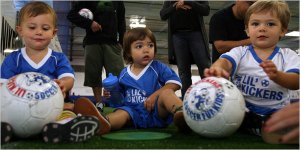Ironically two New York Times articles showed up in my inbox today from different colleagues (thanks ED & ALN) about physical activity on different ends of the age spectrum. I find this ying-yang juxtaposition interesting.
One is an article by sports journalist and author Mark Hyman titled “Sports Training Has Begun for Babies and Toddlers”. Hyman knows this topic well as he’s written a book called Until It Hurts: America’s Obsession With Youth Sports and How it Harms our Kids, which I think is one of the best books about youth sport. I have many concerns about the products and programs Hyman details.
First, the target market is not the little ones, but their parents who will do anything to help their child get ahead, “keep up with the Joneses” and do right by their children. I’d even go a step further and argue the target market is White, middle- to upper-class parents who are highly educated. Some call this demographic of parents “helicopter” parents. Someone told me recently that the youngest members of our society are now being called the Super Millennials and they will be more savvy, entitled, pampered and demanding than Millennials (also known as Gen Y, born between 1981-2000). One of the best books I’ve read about the Millennials is Bruce Tulgan’s “Not Everyone Gets a Trophy: How to Manage Generation Y.” These sports training programs (Gymtrixx, Baby Goes Pro, athleticbaby, The Little Gym) for Super Millennials and their parents are a perfect example how sports can go wrong and why and how youth sports is becoming increasingly professionalized. I mean the little guys in Hyman’s story have on uniforms!
The second article is by Bruce Grierson titled “The Incredible Flying Nonagenarian” about Olga Kotelko. Kotelko is a 91 year old Masters Track & Field athlete who started competing at age 77 and in that time holds 23 world records and has won over 600 gold medals. She is considered one of the world’s greatest athletes. WOW! In the NYT piece if you scroll down a bit, there is a video of her talking about competing and some footage of her in action. Amazing! Tangentially, last spring The Tucker Center for Research on Girls & Women in Sport invited Mariah Burton Nelson to give a Distinguished Lecture on Are Women Aging Successfully? New Thinking and Research about Gender and Physical Activity. You can watch the full length video here.
The reason why I put these two articles together is important. As I stated earlier, youth sport is increasingly professionalized and children are being “trained” at higher levels like “mini pros” at younger and younger ages. While a longitudinal study on the effects of early training, sport specialization, and year round training without rest periods on children and youth has yet to be done, based on data that does exist in pediatric sports medicine, child development, sports psychology and sports sociology I feel I can safely claim that “sports training” for babies is NOT a good idea.
Here are a few reasons why–early sports training can lead to a host of negative and detrimental psychosocial and physical outcomes like burnout, anxiety and eating disorders due to pressure to perform, lack of lifelong enjoyment of physical activity, chronic and overuse injuries, and drop out of sport altogether. Don’t get me wrong, I’m an advocate of kids being active and encouraging free play with children that develops motor and life skills and love of physical activity, but I think there is a fine line between this approach and some of the companies/products Hyman writes about.
Olga Kotelko wasn’t enrolled in “baby sports training” but despite a lack of exposure to this ‘opportunity’, she is a professional athlete. More importantly I’d argue, is that she is an exemplary cautionary tale for eager parents bent on early sport specialization. In the big picture of why parents want their children to participate in sport, what is more important: a) nurturing a lifelong ability and love to participate in physical activity, or b) creating a mini pro that might burn out or not be able to compete in college (let alone later in life) due to over use injuries?



Leave a comment